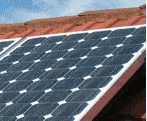Building on a theme in an article we published yesterday, Beyond Zero Emissions has highlighted the important role home solar power installations have in relation to reducing the cost of power generated during peak times.
In yesterday’s article, we mentioned electricity generated via traditional means can cost as much as $12.50 per kilowatt hour wholesale during peak periods, whereas owners of home solar power systems participating in feed-in tariff programs may be rewarded with a worthwhile, but paltry amount in comparison.
Depending on the state, solar households may only receive general retail market rate for surplus electricity. New South Wales is currently only offering net metering, with some electricity retailers kicking in a small amount. While this still certainly makes solar panels a worthwhile investment, it does not recognise the true financial value of the contribution of the electricity generated – even when factoring in other incentives such as the Solar Credits rebate, which will be slashed further this year.
Beyond Zero Emissions (BZE), an Australia-based, non-profit organisation, have expanded on this aspect in a communication distributed yesterday evening
BZE states while households with solar power systems may receive a higher than market rate for electricity they export in some states, during peak periods it could be $11.90 or even more per kilowatt hour less than the “coal and gas guys” receive.
Additionally, while the owner of the solar power system receives some financial benefit, so too do those that don’t have solar panels installed; due to the impact residential solar electricity production has on helping to rein in the costs of peak power.
BZE states a 44c feed in tariff, which is currently the most generous rate still accessible to solar households entering such programs “is much more reasonable when you take into account the wild fluctuations that occur daily as power generators use their market power to game the electricity market, which ultimately is costing consumers.”
BZE claims if a further 3000 megawatts of solar panel capacity were added to Australian rooftops, an amount that Germany managed to install just in December 2011, Australians would be paying at least a billion dollars less for electricity, “amounting to a more significant saving on bills than if we choose not to encourage people to put more solar on their roofs.”
The issue of peak power costs is an important one considering feed in tariffs are under review in New South Wales and as of last Friday, Victoria. Without factoring in this crucial aspect, a “fair price for solar” – all that the industry and solar households want – may never be accurately gauged.












































